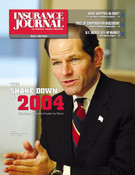The model compensation disclosure measure under consideration by the nation’s state regulators has been met with generally guarded support from agents, brokers and insurers.
The Independent Insurance Agents & Brokers of America (IIABA) announced that it supports the stated goals and objectives of the National Association of Insurance Commissioners’ (NAIC) compensation disclosure amendment, but stressed that it wants the final measure to be one that is more focused and targets only the types of transactions in which wrongdoing has been alleged.
“This is a complex issue, and we certainly need to proceed with precision and deliberation. No one wants to deal with unintended consequences later,” said Robert A. Rusbuldt, chief executive officer of IIABA. “The final reform proposal must be real and meaningful for consumers without creating new and burdensome requirements for main street businesses that do not provide value for customers. We hope to find a happy medium in which consumers have the information they need in order to find the best product and value they deserve, yet without creating needless and costly impediments to doing business.”
Brokers’ view
The Council of Insurance Agents & Brokers (CIAB) stressed the need for uniformity among states in any disclosure requirements and inquiries.
“There is nothing more important to America’s insurance agents and brokers than maintaining the trust of our clients and conducting our business operations with the utmost integrity,” said Ken Crerar, the president of CIAB, adding that the members of his group “wholeheartedly agree with the approach that has been presented.”
At the same time, Crerar expressed frustration at an apparent lack of uniformity and focus in how states are proceeding over the issue.
“We do believe, however, that it is essential that new regulations governing the disclosure of broker compensation arrangements be made uniformly across the nation. To date, there has been a distinct lack of uniformity and coordination with respect to the inquiries sent by several states to insurers and brokers to elicit information about compensation arrangements,” Crerar said.
Crerar urged states to use a single inquiry form, and to limit their inquires to their domestic companies and resident producers. “This would lighten the burden on both the industry and the regulators, who would be free to share information among themselves as necessary without additional inquiries to carriers and brokers,” he argued.
More deliberation needed
From insurer representatives, the NAIC’s Executive Task Force on Broker Activities heard a consensus that the initiatives suggested so far are overly broad and perhaps premature.
Testifying before the task force, Peter Bisbecos, director of legal and regulatory affairs for the National Association of Mutual Insurance Companies (NAMIC), said that any resolution should be narrowly drawn and ultimately guarantee access to competitive markets. He maintained that the whole of the problem has not been clearly defined and thus further deliberation is required before parties can arrive at a solution.
Drawing from the NAIC proposal, Bisbecos offered two examples of why NAMIC believes their more deliberative pace is wise.
First, he noted that there is no clear standard by which to prove the fraud that has been alleged. Some have suggested that absent disclosure, it could be fraudulent for a broker to provide multiple quotes to a consumer if all quotes are from insurers who pay the broker commissions, and none are from companies that do not. Bisbecos argued that it is unknown if producers would have to check with 10, 20 or 30 companies aside from those that normally pay them commissions and that this lack of clarity would lead to extensive civil litigation.
Additionally, not clarifying what constitutes a criminal offense might well be constitutionally vague, according to Bisbecos.
Bisbecos further maintained that companies receiving interrogatories from the states don’t yet know the authority under which these demands for information are issued, or the degree of confidentiality attached to the information that companies will be sending in response. This fundamental issue must be resolved at the outset, Bisbecos said.
The NAIC hearing was initially scheduled to take comment on proposed amendments to the Producer Licensing Model Act, amendments that would require disclosure of broker and agent compensation. The scope of the hearing was subsequently broadened to include any comments on their entire response, including the questions that are being sent to insurers by various state insurance departments.
Brokerage inquiries
As did CIAB in its call for more uniformity in state inquiries, NAMIC also cited some problems with the questionnaires being sent to insurers by the states.
“Overall, the questions are extremely broad and will require extensive effort to provide accurate answers,” Bisbecos maintained. “Even for a company with significant resources and no objection to answering all of the questions, the 30-day deadline is not realistic.”
According to NAMIC, answering many of these questions might improperly require a company to incriminate itself in violation of the 5th amendment to the federal constitution. “We are particularly concerned about this in light of the current atmosphere in which the line between legal and criminal conduct has been significantly blurred,” added Bisbecos.
Finally, NAMIC cited privacy concerns, urging that any template make clear that all answers would remain confidential. Allowing answers to become public could have anti-competitive consequences as they could reveal confidential company information, according to NAMIC.
The Property Casualty Insurers Association of America (PCI) suggested refinements to the NAIC’s draft model and urged regulators to limit the disclosure of any final compensation provisions only to brokers.
“PCI supports open and competitive markets,” said Robert Zeman, the association’s senior vice president of insurance regulatory affairs.
“Transparency in representation and disclosure of broker compensation can be an important component of open, fair, and reasonably regulated markets. With appropriate transparency and disclosure with respect to broker compensation, consumers should be able to make informed purchasing decisions.”
PCI’s testimony argued that when it is clear to consumers that they are purchasing their insurance through an agent–who represents and is being compensated solely by the company–there is no conflict of interest, real or perceived. In these cases, PCI believes that agents should not be required to disclose compensation.
PCI also objected to the proposed requirement of a written consent that the consumer accepted the fact of dual representation. “Notice is what is important, not amassing reams of needless consent forms,” Zeman said.
“It is important that regulators keep their focus on the specific problem of disclosure to consumers where brokers receive payment from both the client and the company,” Zeman said.
“Expanding the reach of this regulation to include all agents and every transaction would impose needless bureaucratic burdens on the industry without delivering any measurable improvements to the marketplace.”
Gary Cohen, general counsel for the California Department of Insurance, asserted that the problem is much broader than that revealed by the New York lawsuits and that it is not yet fully defined. For instance, Cohen argued that even captive agents should be required to disclose because they might be required to sell other products to certain customers and consumers should know about various commission levels so that they could make a fully informed decision.
Feedback summary
Following this presentation, three panels were called to testify. The first panel consisted of NAIC funded consumer representatives. The second panel consisted of agents and brokers. While perspectives varied widely, and various corrective proposals were suggested, there was general agreement on several points:
- Reasonable and appropriate disclosure is desirable.
- The proposed amendments to the model are too broad.
- It is unclear how notice to policyholders would be accomplished.
- The proposed amendments do not reflect the way business is done by producers.
The NAIC has said that it wants to have a final decision on the amendments by the end of the year. Future action beyond that point remains unclear.
Topics Carriers Agencies Legislation Talent
Was this article valuable?
Here are more articles you may enjoy.


 Florida Appeals Court Pulls the Plug on Physician Dispensing in Workers’ Comp
Florida Appeals Court Pulls the Plug on Physician Dispensing in Workers’ Comp  Meta Loses Insurance for Defense in Major Social Media Addiction Litigation
Meta Loses Insurance for Defense in Major Social Media Addiction Litigation  Deep Freeze and Drought Fueled a Massive Florida Wildfire
Deep Freeze and Drought Fueled a Massive Florida Wildfire  What Berkshire’s CEO Abel Said About Insurance
What Berkshire’s CEO Abel Said About Insurance 



